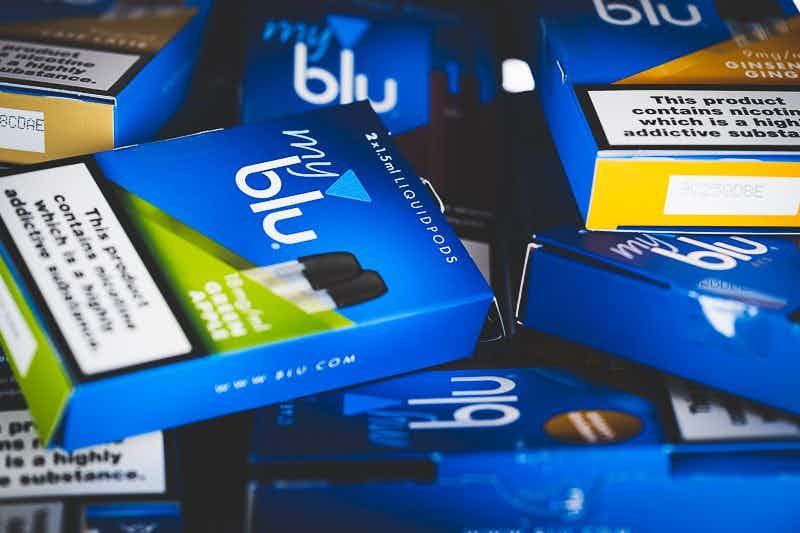All three major U.S. tobacco companies that sell vaping products have now submitted Premarket Tobacco Applications (PMTAs) to the FDA. Fontem US LLC, a division of Imperial Brands, has applied for marketing approval for its myblu pod vape and some prefilled pods for the device.
The myblu is a simple pod device that offers pods in a variety of flavors. Fontem says its PMTA includes “a wide range of...myblu electronic vaping products,” but doesn’t specify which flavors have been submitted to the FDA for approval.
“We agree that the electronic vaping industry should be held to the highest product and marketing standards while providing adult smokers with alternative products that could serve the interest of the public health,” said Fontem president Antoine Blonde. “Fontem US looks forward to working with the FDA as the agency develops and enforces an evidence-based regulatory policy.”
Fontem’s parent company, Imperial Brands (formerly Imperial Tobacco), owns a variety of tobacco brands sold around the world, including Winston, Kool, Player, Davidoff, and Gauloises cigarettes. Fontem itself was originally created to manage a portfolio of patents Imperial acquired from Chinese vaping pioneers Ruyan, including the original e-cigarette patents granted to inventor Hon Lik.
Logic (owned by Japan Tobacco International) submitted a PMTA last August, according to the Wall Street Journal. Reynolds American (RJ Reynolds, now owned by British American Tobacco) submitted applications for its Vuse Solo cigalike device and several cartridge flavors last October. Reynolds submitted additional applications for its Vuse Ciro and Vibe products earlier this month, along with apps for “multiple flavor variants for each brand style.”
None of the tobacco company vaping products are currently sold in flavors other than tobacco and menthol. The FDA announced in January that it would no longer allow sales of flavored pod- and cartridge-based vape products until PMTAs for those products were approved. However, unlike independent vaping manufacturers, Imperial, Reynolds and JTI can sustain themselves selling cigarettes while their applications are reviewed by the FDA.
Neither NJOY nor JUUL, the most popular convenience store vaping products not made by a tobacco company (although JUUL is 35 percent owned by Altria), have announced PMTA submissions yet. JUUL is expected to submit an application for a next-generation “smart vape” that includes Bluetooth functionality and user recognition.
At least 30 PMTAs have already been submitted and accepted for review by the FDA, according to Center for Tobacco Products director Mitch Zeller. However, the CTP does not publish the names of PMTA applicants until the agency takes action on a specific submission.
The FDA postponed the deadline for all PMTA submissions last week, after receiving permission for the delay from a federal appeals court. The original May 12 deadline has been pushed back four months to Sept. 9, due to logistical problems caused by the coronavirus pandemic for both the agency and companies intending to file applications.
Most vaping advocates do not believe the FDA will approve PMTAs for bottled e-liquid in flavors other than tobacco and menthol, and some think the agency won’t approve e-liquid or devices for open-system vaping at all. E-liquid is the primary profit driver for vape shops, and the independent vaping industry depends on a wide variety of e-liquid flavors being available.
In a January radio interview, Health and Human Services Secretary Alex Azar promised to create a “streamlined” PMTA pathway for small vaping manufacturers, but neither the FDA nor the Trump administration has proposed any changes to the process since Azar’s statement. The PMTA deadline will now fall two months before the presidential election, with more than 100,000 vape industry employees and several million vapers prepared to vote at least partly based on what happens to the millions of vaping products currently available.

Jim McDonald
Vaping for: 13 years
Favorite products:
Favorite flavors: RY4-style tobaccos, fruits
Expertise in: Political and legal challenges, tobacco control haters, moral panics
Jim McDonald
Smokers created vaping for themselves without help from the tobacco industry or anti-tobacco crusaders, and I believe vapers and the vaping industry have the right to continue innovating to give everyone who wants to use nicotine access to safe and attractive non-combustible options. My goal is to provide clear, honest information about vaping and the challenges nicotine consumers face from lawmakers, regulators, and brokers of disinformation. You can find me on Twitter @whycherrywhy


